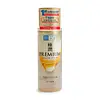What's inside
What's inside
 Key Ingredients
Key Ingredients

 Benefits
Benefits

 Concerns
Concerns

No concerns
 Ingredients Side-by-side
Ingredients Side-by-side

Water
Skin ConditioningDipropylene Glycol
HumectantGlycerin
HumectantPentylene Glycol
Skin Conditioning1,2-Hexanediol
Skin ConditioningNiacinamide
SmoothingAcetyl Hexapeptide-8
HumectantCopper Tripeptide-1
Skin ConditioningSh-Polypeptide-121
Skin ConditioningDipeptide Diaminobutyroyl Benzylamide Diacetate
Skin ConditioningOligopeptide-68
BleachingPalmitoyl Tripeptide-8
Skin ConditioningAllantoin
Skin ConditioningSodium Hyaluronate
HumectantAcetyl Glucosamine
Skin ConditioningSerine
MaskingAlanine
MaskingGlycine
BufferingThreonine
Arginine
MaskingProline
Skin ConditioningBetaine
HumectantSodium PCA
HumectantSodium Lactate
BufferingPCA
HumectantGlutamic Acid
HumectantLysine Hcl
Skin ConditioningTocopherol
AntioxidantDextran
Glycine Soja Oil
EmollientHydrogenated Lecithin
EmulsifyingAmmonium Acryloyldimethyltaurate/Vp Copolymer
Polyacrylate Crosspolymer-6
Emulsion StabilisingButylene Glycol
HumectantXanthan Gum
EmulsifyingEthylhexylglycerin
Skin ConditioningAdenosine
Skin ConditioningPolyquaternium-51
Skin ConditioningDisodium EDTA
Citric Acid
BufferingCaprylyl Glycol
EmollientT-Butyl Alcohol
PerfumingPotassium Sorbate
PreservativeSodium Oleate
CleansingWater, Dipropylene Glycol, Glycerin, Pentylene Glycol, 1,2-Hexanediol, Niacinamide, Acetyl Hexapeptide-8, Copper Tripeptide-1, Sh-Polypeptide-121, Dipeptide Diaminobutyroyl Benzylamide Diacetate, Oligopeptide-68, Palmitoyl Tripeptide-8, Allantoin, Sodium Hyaluronate, Acetyl Glucosamine, Serine, Alanine, Glycine, Threonine, Arginine, Proline, Betaine, Sodium PCA, Sodium Lactate, PCA, Glutamic Acid, Lysine Hcl, Tocopherol, Dextran, Glycine Soja Oil, Hydrogenated Lecithin, Ammonium Acryloyldimethyltaurate/Vp Copolymer, Polyacrylate Crosspolymer-6, Butylene Glycol, Xanthan Gum, Ethylhexylglycerin, Adenosine, Polyquaternium-51, Disodium EDTA, Citric Acid, Caprylyl Glycol, T-Butyl Alcohol, Potassium Sorbate, Sodium Oleate
Water
Skin ConditioningButylene Glycol
HumectantHydroxyethyl Urea
HumectantPentylene Glycol
Skin ConditioningPPG-10 Methyl Glucose Ether
Skin ConditioningDipropylene Glycol
HumectantDiglycerin
HumectantTriethyl Citrate
MaskingPEG-32
HumectantCarbomer
Emulsion StabilisingPEG-75
HumectantPhenoxyethanol
PreservativeGlycosyl Trehalose
Emulsion StabilisingDisodium Succinate
MaskingSorbitol
HumectantPropanediol
SolventSodium Hyaluronate
HumectantHydrogenated Starch Hydrolysate
HumectantDiethoxyethyl Succinate
SolventPotassium Hydroxide
BufferingSuccinic Acid
BufferingDisodium EDTA
Polyquaternium-51
Skin ConditioningCaprylhydroxamic Acid
Hydroxyethylcellulose
Emulsion StabilisingXanthan Gum
EmulsifyingSodium Acetylated Hyaluronate
HumectantAphanothece Sacrum Exopolysaccharides
AbsorbentLactococcus/Hyaluronic Acid Ferment Filtrate
Hydroxypropyltrimonium Hyaluronate
Sodium Hyaluronate Crosspolymer
HumectantWater, Butylene Glycol, Hydroxyethyl Urea, Pentylene Glycol, PPG-10 Methyl Glucose Ether, Dipropylene Glycol, Diglycerin, Triethyl Citrate, PEG-32, Carbomer, PEG-75, Phenoxyethanol, Glycosyl Trehalose, Disodium Succinate, Sorbitol, Propanediol, Sodium Hyaluronate, Hydrogenated Starch Hydrolysate, Diethoxyethyl Succinate, Potassium Hydroxide, Succinic Acid, Disodium EDTA, Polyquaternium-51, Caprylhydroxamic Acid, Hydroxyethylcellulose, Xanthan Gum, Sodium Acetylated Hyaluronate, Aphanothece Sacrum Exopolysaccharides, Lactococcus/Hyaluronic Acid Ferment Filtrate, Hydroxypropyltrimonium Hyaluronate, Sodium Hyaluronate Crosspolymer
 Reviews
Reviews

Ingredients Explained
These ingredients are found in both products.
Ingredients higher up in an ingredient list are typically present in a larger amount.
Butylene Glycol (or BG) is used within cosmetic products for a few different reasons:
Overall, Butylene Glycol is a safe and well-rounded ingredient that works well with other ingredients.
Though this ingredient works well with most skin types, some people with sensitive skin may experience a reaction such as allergic rashes, closed comedones, or itchiness.
Learn more about Butylene GlycolDipropylene Glycol is a synthetically created humectant, stabilizer, and solvent.
This ingredient helps:
Dipropylene glycol is technically an alcohol, but it belongs to the glycol family (often considered part of the ‘good’ alcohols). This means it is hydrating and gentle on skin unlike drying solvent alcohols like denatured alcohol.
As a masking agent, Dipropylene Glycol can be used to cover the smell of other ingredients. However, it does not have a scent.
Studies show Dipropylene Glycol is considered safe to use in skincare.
Learn more about Dipropylene GlycolDisodium EDTA plays a role in making products more stable by aiding other preservatives.
It is a chelating agent, meaning it neutralizes metal ions that may be found in a product.
Disodium EDTA is a salt of edetic acid and is found to be safe in cosmetic ingredients.
Learn more about Disodium EDTAPentylene glycol is typically used within a product to thicken it. It also adds a smooth, soft, and moisturizing feel to the product. It is naturally found in plants such as sugar beets.
The hydrophilic trait of Pentylene Glycol makes it a humectant. As a humectant, Pentylene Glycol helps draw moisture from the air to your skin. This can help keep your skin hydrated.
This property also makes Pentylene Glycol a great texture enhancer. It can also help thicken or stabilize a product.
Pentylene Glycol also acts as a mild preservative and helps to keep a product microbe-free.
Some people may experience mild eye and skin irritation from Pentylene Glycol. We always recommend speaking with a professional about using this ingredient in your routine.
Pentylene Glycol has a low molecular weight and is part of the 1,2-glycol family.
Learn more about Pentylene GlycolPolyquaternium-51 is a polymer salt. It helps hydrate the skin by creating a film on top. This film traps moisture in, keeping your skin soft and hydrated.
Sodium Hyaluronate is hyaluronic acid's salt form. It is commonly derived from the sodium salt of hyaluronic acid.
Like hyaluronic acid, it is great at holding water and acts as a humectant. This makes it a great skin hydrating ingredient.
Sodium Hyaluronate is naturally occurring in our bodies and is mostly found in eye fluid and joints.
These are some other common types of Hyaluronic Acid:
Learn more about Sodium HyaluronateWater. It's the most common cosmetic ingredient of all. You'll usually see it at the top of ingredient lists, meaning that it makes up the largest part of the product.
So why is it so popular? Water most often acts as a solvent - this means that it helps dissolve other ingredients into the formulation.
You'll also recognize water as that liquid we all need to stay alive. If you see this, drink a glass of water. Stay hydrated!
Learn more about WaterXanthan gum is used as a stabilizer and thickener within cosmetic products. It helps give products a sticky, thick feeling - preventing them from being too runny.
On the technical side of things, xanthan gum is a polysaccharide - a combination consisting of multiple sugar molecules bonded together.
Xanthan gum is a pretty common and great ingredient. It is a natural, non-toxic, non-irritating ingredient that is also commonly used in food products.
Learn more about Xanthan Gum